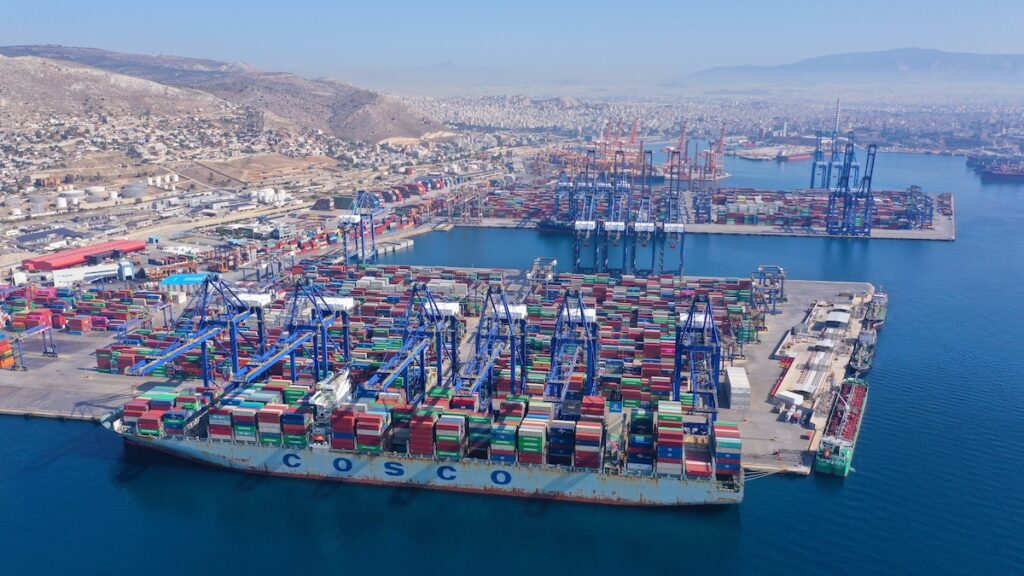
Aerial drone photo of import and export terminal of the China Ocean Shipping Company (COSCO) in Perama, Attica, Greece.
Renowned for its warm climate and stunning scenery, Malta is an archipelago situated in the center of the Mediterranean Sea. With a population of little over half a million, it’s a small country (the smallest in the EU, in fact) with a big history. A nation that has known many rulers, including the Romans, the Moors, the French, and the British, one wonders if it is about time to add China to this list. Malta has not reached that point just yet, but the Chinese Communist Party’s (CCP) interest in the country is undeniable.
In November of 2018, Malta became a member of China’s Belt and Road Initiative (BRI). For the uninitiated, by signing up to this project, a country essentially enters into a deal with Chinese banks, tech giants, and construction companies, allowing these enterprises to construct and sometimes control various roads, railways, and airports, as well as power plants, 5G networks, and fiber-optic cables. BRI membership is fraught with danger. To be in debt to China is the stuff of nightmares. Nevertheless, the initiative now boasts 149 members, and Malta happens to be one of them.
As mentioned, Malta sits in the center of the Mediterranean Sea. Its location, halfway between Sicily and the coast of North Africa, makes it a country of strategic importance. Throughout history, its geographical location has played a vital role in its economic, political, and cultural evolution. Previous rulers knew that if they could dominate the Maltese archipelago, they could dominate the Mediterranean region, which would give them an advantage over enemies. Although warfare has changed considerably in the years since, the strategic significance of Malta has not. This fact is not lost on the CCP.
Chinese companies now own major stakes in Malta’s leading electrical companies, giving these CCP-backed investors access to the country’s power grid. The prestigious University of Malta is home to one of China’s many Confucius Institutes, which are nothing more than Trojan horses through which the CCP spreads its propaganda.
Meanwhile, two Chinese shipping giants, China Ocean Shipping Company, more commonly known as COSCO, and China Merchants Port Holdings have stakes in the Maltese port of Marsaxlokk. In truth, both companies have stakes in various Mediterranean ports, including some in France, Spain, Turkey, and Italy. The Sicilian seaport of Palermo, situated just 160 miles from Malta, is of particular interest to the CCP (Italy, it is important to note, is also a part of the BRI). Not only is the port of Palermo the largest in Sicily, it is arguably the most important in the Mediterranean.
In Spain, rather interestingly, COSCO has a 51% ownership stake in Noatum Ports (head office in Barcelona), a world leader in logistics and port operations. Meanwhile, China has been strategically ramping up engagement with Egypt. In August 2022, the Egyptian government agreed to begin the construction of the Sokhna-Dekhila axis. This ambitious project, which aims to link the Red Sea with the Mediterranean, will be executed by Hutchison Ports, a Hong Kong-based operator. COSCO, a co-investor, is also part of this project.
Some 380 miles away, Israel, another Mediterranean country, is also falling under Chinese influence. Shanghai International Port Group (SIPG) now operates the Bay Port at Haifa. As Israel’s only natural harbor, its importance cannot be emphasized enough. In Greece, a country synonymous with the Mediterranean, COSCO owns a two-thirds majority stake in the port of Piraeus. Located at the intersection of three continents (Europe, Asia, and Africa), it is one of the world’s most important shipping centers. In nearby Croatia, Chinese investors hold a 76% stake in Zadar port, located in central Dalmatia.
What is going on in the Mediterranean must be viewed through a much broader lens. Around the world, from southern Africa to South America, China is gaining control of an increasing number of ports. According to COSCO’s website, the company now owns and operates 391 container vessels with a total capacity of approximately 2.1 million TEUs (or 20-foot containers), as well as 498 container vessels with a total capacity of 2.9 million TEUs. Furthermore, COSCO also operates 408 international and domestic shipping routes, including 268 international routes
Another huge port developer, China Merchants Group, isn’t doing too badly either. On its website, readers are told that the company, currently headquartered in Hong Kong, has major operations that span the globe. China Merchants Group, according to the site, is the largest international port player “in terms of total cargo throughput and equity throughput.” One needn’t be a dyed-in-the-wool China hawk to be concerned. The main transport mode for global trade is ocean shipping, with around 90% of traded goods carried over the waves.
China, as is clear to see, has a vise-like grip over our most important mode of trade. Don’t expect this grip to weaken anytime soon.
